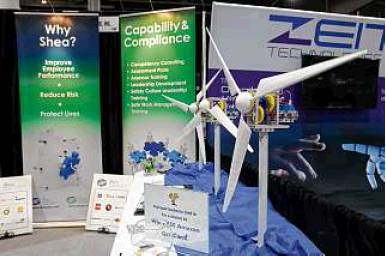Oil, gas industry’s big show making room for renewables
By Shelby Webb STAFF WRITER
From Tony Davenport’s perspective, what’s coming is inevitable.
The company he represented at the Offshore Technology Conference on Tuesday as a manufacturing agent, Amphernol, changed the name of one of its divisions from Amphernol Oil & Gas Technologies to Amphernol Energy Technologies.
Earlier this year, French oil major Total changed its name to TotalEnergies, reflecting its climate change push. And Nov, one of the largest manufacturers of drilling rigs and machines, has opened a division dedicated to installing wind turbines.
Now OTC, Houston’s signature event for the oil and gas industry, is including speakers and exhibitors involved in the energy transition — giving renewable energy a platform in front of an audience steeped in the fossil fuel industry.
It signals the shift in the traditional energy industry as companies begin to lean into cleaner sources of power, transitioning from fossil fuels to renewable options.
“It’s coming, and everybody’s more conscious about green energy versus oil and gas energy,” Davenport said. “There’s even talk now about offshore platforms that used to operate using gas or oil to operate using electricity, running a cable from shore to the platform.”
Thirteen of OTC’s 86 panel and speaking events are focused on renewables or the energy transition. Massachusetts-based
Greentown Labs — North America’s largest climate tech incubator that opened its second location in Houston this year — hosted a panel about offshore wind technology. The conference’s opening general session, “Focus on the Future,” featured three speakers who almost exclusively talked about emissions, the energy transition and the role of renewables in the offshore sector.
“Make no mistake — the world needs more and cleaner energy,” said Bill Langin, senior vice president of deepwater exploration for Shell, at the session. “We need to decarbonize barrels and also make new forms of energy.”
The presence of renewables and newer forms of energy at OTC dovetails with an increase in local and national actions and conversations about the energy transition.
A group of 27 unions in Texas last month commissioned a report that found the state could gain 1 million jobs if it follows ambitious renewable energy plans. Then the Texas AFL-CIO created the Texas Climate Jobs Project to try to make the report’s recommendations a reality. The Biden Administration announced in April it would aim to cut carbon emissions by at least 50 percent by 2050.
Years earlier, oil majors, including BP, Chevron and Royal Dutch Shell, had launched subsidiaries dedicated to funding and researching new energy technologies, and they have increasingly sponsored panels and events related to renewable energy.
Leigh Ann Runyan, executive director of OTC, said there have been efforts for years to put more discussions about renewables on the convention’s annual agenda, and that its board and executive team wholly endorsed the move this year.
“We’ve been wanting to talk about the energy transition, which has been accelerated in the last 12 months,” Runyan said. “So many of the operating companies have launched their new programs to reduce their carbon footprints and to do what they can with the energy transition. And OTC wants to be a part of that.”
Still, introducing a burgeoning industry that may well soon disrupt oil and gas did not receive a uniformly warm reception among those attending OTC this year in person and online.
Taking questions after a presentation by Peter Green, deputy lab director of the National Renewable Energy Laboratory, the moderator laughed as she read a submission from an online participant, who she said “must be from the oil and gas industry.”
“Do you think we should stop using fossil fuels in the near future?” the question read.
“I’m a realist here. Markets and convenience are going to play a huge role,” Green responded. “It’s not going to go away any time soon — it just depends how we manage it.”
Mike Matthews, U.S. representative for the World Forum Offshore Wind, said he heard concerns from oil and gas employees at other renewable energy panels, as well. Still, he said, those he’s spoken to about his work have been open to learning more.
“It’s been an educational opportunity,” he said. “What we’re here to do is to take that business side and see what kind of opportunities we can assist with. We’re not stepping on oil and gas’ toes. We want to work together — you have the platform, you have the tech, you have the supply chain. Let’s build some offshore wind platforms out here.”
There did seem to be a disconnect between the discussions about renewable energy held at the upstairs conference rooms and the trade show downstairs, which was filled with booths depicting oil rigs, huge drills for boring into the earth and sections of pipelines used to move crude from the sea bed to the surface.
Among them was an exhibit for Missouri City-based KeyDrill Technology, where Director of Sales Jon Weatherly was working. The company’s 10 employees design and manufacture directional drilling tools, from hardware to software.
Weatherly said he didn’t see a problem with having more renewable vendors and conversations at OTC. Already, he said, some customers visiting his booth talked about using the company’s drilling tools to start geothermal power operations.
He’s a little more skeptical about wind and solar, because the sun doesn’t always shine and the wind doesn’t always blow, and utility-scale battery storage hasn’t materialized in a meaningful way.
“But hey, we need more energy, so I don’t think it’s a problem. And at some point, do we run out of oil? Who knows,” he said. “I just think a hard cut-over can’t happen. That’s my view — let’s transition but let’s do it smartly.” shelby.webb@chron.com

